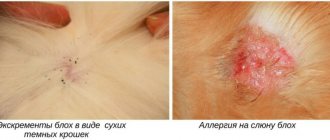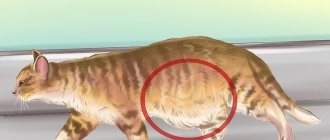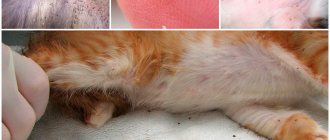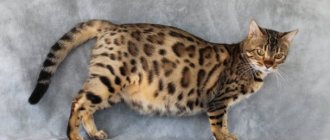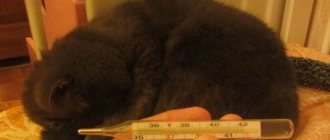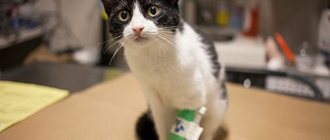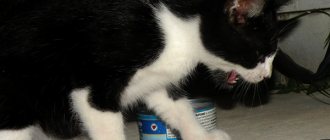The feeding period for kittens is important. The health of the offspring depends on it, so the breeder needs to carefully monitor the daily routine and diet of the nursing mother.
Sometimes a serious problem arises - worms in a nursing cat.
It is worth figuring out whether it is possible to deworm an adult animal and what drugs to use so as not to harm the kittens that are born.
Treatment of worms in a nursing cat - general rules
According to generally accepted rules, prevention of worms in cats is carried out before planned mating. In addition, all preventive measures are carried out not only for the cat, but also for the cat. As you know, animals can infect each other with parasites, viruses and infections through close contact.
Let’s say that circumstances arise that you have a pregnant or already lactating cat on your hands that has not received proper prevention. What to do next? If the cat has already given birth, she will nurse the kittens for a month.
What threats exist for babies:
- Intrauterine infection with roundworms is one of the very popular types of roundworms, or rather, their larvae can penetrate the placental barrier and infect embryos in the womb. In this case, kittens are born small, thin, severely stunted in growth and may die before reaching the age of one month. Such worms do not threaten the life of a cat unless their infestation has reached a critical level.
- Infection with worms through milk - again, we are talking about a variety of roundworms, the larvae of which penetrate the mammary glands during pregnancy and infect kittens through mother's milk. This type of infestation rarely results in the death of kittens, but the babies are likely to be delayed in growth and development.
In addition to parasites that threaten kittens, a cat can be infected with worms, which can harm its weakened body.
Treatment is selected taking into account the following factors:
- The course of childbirth - if the cat is weakened after childbirth, anthelmintic measures are postponed until she gets stronger. To maintain the body, therapy is prescribed: vitamins, immunostimulants, buffer solutions.
- The number of kittens in the litter and the amount of milk - if a cat is underfeeding the offspring, it is wiser to wean them and transfer them to artificial nutrition in order to carry out anthelmintic measures on the young mother.
- The mental state of the cat - the pet can fall into severe stress, which will lead to a significant deterioration in its condition if it is strongly attached to the kittens, and you try to take them away.
- Degree of dehydration - if no more than 5 days have passed since the birth, it is better not to carry out anthelmintic measures.
- Degree of exhaustion - if the cat has been nursing kittens for more than a month and the body is exhausted, using standard anthelmintics is too risky.
Advice: while the cat is nursing kittens, do not use any medications until you consult a veterinarian. Some drugs, including anthelmintics, can remain in the blood (and therefore penetrate into milk) for up to 3-5 days.
When and how can you worm a nursing cat?
Before worming a nursing cat, you need to make sure that the cat is infected with parasites and is not experiencing discomfort for some other reason.
Advanced helminthic infestation can be detected by the following symptoms:
- Exhaustion, apathy, restless sleep, chronic fatigue.
- Nausea, vomiting, diarrhea, constipation.
- Pallor or cyanosis of the mucous membranes.
- Copious secretion of saliva.
- Poor or perverted appetite.
- General signs of intoxication.
If you discover parasites in a nursing cat, you need to act carefully. First, you should consult a veterinarian, who will determine the degree of harm that the parasites have already caused to the kittens. Further, depending on the condition of the cat and its offspring, two action algorithms are possible.
Prevention of worms is carried out immediately if:
- Kittens are delayed in growth and development.
- The cat has signs of intoxication or the veterinarian has discovered other ailments associated with helminthic infestation.
Prevention is postponed until the kittens are finished feeding if:
- The kittens have enough milk and gain weight within normal limits.
- The cat has a normal appetite and water-salt balance.
Important! The most reliable method of diagnosis is a laboratory examination of stool.
Tests are taken several times with a break of 3-4 days. Laboratory analysis will reveal not only the presence of parasites, but also their type, which greatly simplifies the selection of adequate therapy.
What to do if a veterinarian is not available?
What to do if a veterinarian is unavailable, and a nursing cat needs to be treated for worms urgently? In this case, the owner has two alternatives:
- Wean the kittens from their mother and transfer them to artificial nutrition.
- Use traditional methods of preventing helminthiasis.
The first option is relevant if the kittens are severely delayed in growth and development. It is important to understand that weaning excludes any contact with the cat until prevention is carried out. Worm eggs can be contained in a cat's saliva, so she can re-infect her babies by licking them. They can be returned to the mother when the active ingredients of the anthelmintic leave the body (usually 24–72 hours).
Note! Folk remedies for the prevention of worms do not have a proven therapeutic effect, but they will not harm cats or kittens.
Review of the best anthelmintic tablets for cats: which product to choose
Cat worms are a common colloquial term for parasites that attack a cat's digestive system and feed off another organism.
All animals, including domestic ones, are susceptible to this. Domestic cats that go outside are most (but not exclusively) affected. Parasites that can enter their bodies weaken the animal and cause various diseases.
To avoid unpleasant symptoms and not become infected with worms, the cat needs to be dewormed regularly.
Indications for the use of deworming tablets for cats
The most common pests in a cat's body are roundworms. These are parasites that an animal can become infected with on the street, when it digs in the ground, drinks water from a puddle, and at the same time swallows their eggs. The presence of roundworm eggs in soil and sand is not uncommon. Kittens that suck the milk of a sick mother can also get sick.
Favorite
Less common are nematodes, visible only under a microscope (infection occurs when an animal swallows larvae in the ground) and tapeworms (invaded the body when a cat eats infected rodents or birds).
The latter are visible in the feces or on the hair around the anus in the form of white fragments resembling grains of rice. It happens that a cat (usually young or with a weakened immune system) will bring back Giardia (a flagellated microorganism) from a walk.
They enter the stomach through contaminated raw meat or through ingestion of cysts found in the soil.
Parasites are transmitted:
- by food;
- through the placenta;
- with mother's milk;
- upon contact with feces;
- upon contact with a sick animal;
- through fleas;
- Parasites can be transferred from the yard to the home on a person's shoes.
Roundworms are excreted in feces or vomit. They are easy to notice because they resemble white, rather thick threads 5-10 cm long.
Roundworms are the most common animal parasites
Attention! Many worms do not cause any symptoms, but most often an infected cat suffers from diseases related to the digestive system.
If there are worms, then a serious problem is: chronic diarrhea, vomiting, weight loss, it happens that mucus and blood appear in the stool. The animal may be apathetic, weakened, restless (often wagging its tail), and, depending on the type of parasite, lacking appetite. His fur becomes dull and weak.
The symptoms themselves are not a sufficient reason to diagnose the presence of worms, so if the cat owner suspects an infection, special tests must be performed. The main thing is to examine the stool - it is best to try to collect several samples over 3-4 days and take them to the veterinarian.
How to feed a cat a pill
How to give a cat deworming tablet and how often to give it
Cat and pills
Having returned from the veterinarian who prescribed medication for their pet, many are faced with the problem of how to give an anthelmintic to the animal. This could be an anti-worm tablet or an antibiotic. It doesn't matter what. It is important how to get a cat to take medicine. After all, unlike a person, an animal does not understand that they are trying to cure it.
- You can hide deworming tablets for cats in food.
It is better to add it to wet food with the addition of sauce. Theoretically, the method is the simplest and least stressful for the cat and the owner. In practice, there is no certainty that the cat will eat the pill.
She can lick the food and leave the deworming tablets for cats in the middle of the bowl. In addition, cats have a very good sense of smell - they sense a foreign odor and refuse to eat.
- You can try giving your cat a dewormer with water.
Dissolve the tablet in water, draw the mixture into a syringe and then inject it into the mouth. Another problem arises: not all anthelmintic drugs for cats can be administered in this way - it is better to ask your veterinarian. If the tablet is very bitter, the result will be vomiting and excessive salivation.
To avoid harming your pet, you should gently hold his head and lightly squeeze his jaws on the sides so that he opens them. With your other hand, place the tablet as deeply as possible on your tongue.
Forced administration of a pill to a cat
When the cat closes its mouth, after a second, stroke its throat. This will encourage him to swallow the medicine. As soon as he does this, give him time to calm down and try to cuddle him a little.
Important! After administering deworming tablets for cats, it is necessary to give the animal water with a syringe (about 4-5 ml per tablet) to push the medicine into the stomach.
Alternatively, after swallowing the tablet, you can give the cat some wet food or tuna sauce - they will serve the same role - a “bulldozer” pushing the tablet into the stomach.
- It's even better to add dewormers for cats to the delicacy.
Cat hunting sausages are perfect.
Cut it, put an anthelmintic drug in the form of a tablet into one of the pieces, and serve it to the animal. It will be better if the cat eats it himself.
For reference: the choice of method of administering the drug depends on the owner of the animal and the behavioral characteristics of the particular cat. Only the owner will be able to correctly “persuade” the murka to take the medicine.
Side effects
Deworming remedy for kittens: what to do
Usually, if the instructions are followed, there should be no side effects.
The owner must give antihelminthic drugs for cats in a strictly defined dose. If you exceed the amount of medicine, poisoning is possible.
Under no circumstances should “adult” tablets be given to small kittens or pregnant cats. Any medications for worming are toxic, especially those that are applied externally, drop by drop, to the withers.
During the treatment period, you should carefully monitor your pet, its well-being, especially control its stool, because medications can cause diarrhea, or vice versa - constipation.
Is it possible to give deworming tablets to a pregnant or lactating cat?
Nursing mother
Flea drops for cats: remedy, tablets
It is important to take care of your pregnant cat, providing her with good nutrition and excellent medical care. Always use best breeding practices regarding hygiene and separation of pregnant cats from others, as well as infectious disease research where indicated.
Attention! Deworming a cat during pregnancy is very important, as worms can pass to newborn kittens through the placenta or through milk.
The medications must be safe for the cat during this period. It is best if the names are provided by a veterinarian who knows for sure that the product being used is effective but safe for cats and unborn kittens.
Any supplements, free or ridiculously cheap medications should be avoided as they can be dangerous. You should always consult your veterinarian before giving anything to a pregnant cat. Newborn kittens are completely dependent on milk supplied by their mother during the first four weeks of life - this should not be forgotten when choosing an anti-worming drug.
If a cat in an interesting situation feels normal with the presence of worms, it is better to hold off on worming. It would be correct to do this before mating, like other important vaccinations.
Because medications can harm the expectant mother and her children, even causing miscarriages. But, if the worms have tormented the animal, it will still have to be treated.
However, under no circumstances should this be done in the last trimester of pregnancy.
Review of anthelmintics
There are quite a lot of medicines, including inexpensive ones. What is the best anthelmintic for cats? The following describes the most popular and used ones.
- Kanikvantel plus is a broad-spectrum drug used for the treatment and prevention of invasions. Active ingredients: fenbendazole and praziquantel. Acts against Giardia, nematodes and cestodes. Suitable for adult cats and dogs only.
- Dirofen Plus - deworming tablets for kittens. Prescribed from 3 months of age. This low-risk medicine acts on all phases of worm development and has virtually no side effects. The main thing is that the animal does not have individual intolerance and is not weakened.
- Cats especially like Kanikquantel with the taste of meat and fish. Before using it, the animal should be cleaned of blood-sucking insects. The shelf life is much longer than that of other drugs. Should not be given to pregnant women or kittens.
- Milbemax is used for young and adult cats, only the dosage is different. Helps fight cestodes, trematodes, nematodes. Contraindicated for liver and kidney diseases.
- Drontal is used for the prevention and therapeutic treatment of cats against round and tape helminths. Do not give to kittens and old cats.
- Prazitel is good because it contains olive oil, which protects the animal from intoxication as the parasites decompose inside. The suspension has a pleasant taste and is easily administered to the pet using a syringe.
- Alben is well tolerated by animals of all ages; it is given to dogs and cats once. Contraindicated for pregnant and lactating women.
- Azinox is perhaps the best prevention and treatment of cestodiasis in dogs and cats. Indicated from 3 weeks of age.
- Troncil is given to the animal forcibly or with food and water. For prevention, it is enough to use once every 3 months.
- Milprazone for kittens and cats weighing up to 2 kg. Prescribed for deworming and prevention of diseases caused by larval forms and mature cestodes.
- Cestal Cat with liver flavor is low-toxic and well tolerated by animals. For kittens - from 3 weeks.
Medicines for kittens
Baby at the doctor
For children, helminths are much more dangerous than for adults, especially since worms parasitize not only in the intestines, but also in the liver, lungs, and even the heart.
Kittens' bodies are less resistant to the harmful effects of parasites. Therefore, treatment should be started for the first time after 3 weeks of life, and then undergo two stages of deworming with an interval of 2 weeks. Kittens can receive subsequent doses of the drug every 3 months.
Complex preparations are much more convenient to use. They are also used in the form of drops on the withers. Many people trust their pets to IN-AP complex. There are good reviews about Prazicide sweet suspension, but it is prescribed individually, once for therapeutic and prophylactic purposes.
Dirofen Plus, described above, has proven itself to be excellent. An effective deworming drug for kittens is Prazitel in the form of a suspension or tablets.
How to choose a medicine to fight internal parasites
Roundworms produce a large number of eggs and after just a few generations, the number of parasites can reach enormous values.
If animals are not subject to periodic parasitological testing, the correct course of action is to regularly deworm adult cats using appropriate anthelmintic drugs. Depending on the risk of infection with one or more types of helminths, a drug with a wide or narrow range of action can be selected for therapy.
Measures to prevent helminthic infestations in cats
It is important to keep the bowl clean
Fecal parasite testing can be done on average once every three months, and for cats that are in large crowds, go outside (at least into a protected garden), or eat raw meat, the test should be repeated monthly. Several days' worth of samples (optimally 3 days) should be collected and stored securely in the refrigerator.
Research prior to deworming treatment has two main advantages. Firstly, the doctor can determine what specific type of parasite attacked the cat and give a drug selected to combat it specifically.
Secondly, if the cat is not infected with worms, do not prescribe medicine unnecessarily.
If for some reason it is not possible to regularly analyze stool, the doctor will give you a broad-spectrum anthelmintic.
The presence of parasites also results in diseases caused by the toxins they secrete. Parasites can cause poisoning, as well as allergies and skin diseases.
Adult cats should be dewormed once every 3 months. Thus, the owner destroys the parasites and prevents their harmful effects on the pet’s gastrointestinal tract.
It is worth remembering that deworming a cat does not prevent new parasites from entering its body.
The risk of parasite infection can be limited by regularly treating resting and eating areas. In this case, you need to use special preparations, do not give the cat raw meat, do not let it outside, and promptly remove the tray with excrement.
Important! Some worms in cats can be dangerous to humans.
Fortunately, the cat parasite rarely spreads to humans. Those most at risk are young children who do not yet care about hygiene (they pet the cat and then put dirty hands in their mouth) and have lower immunity.
The easiest ways to become infected are with ascariasis and tapeworms, and more difficult with protozoa and nematodes. Parasites can be dangerous to the life and health of people, so it is necessary to take care not only of your pet’s hygiene, but also of your own.
After feeding or stroking your pet, be sure to wash your hands thoroughly.
Source: https://gafki.ru/koshki/tabletki-ot-glistov.html
Effective medications for worms in a nursing cat
When kittens are transferred to artificial feeding, any medications can be used to prevent worms in a cat. When choosing a medicine, read the entire instructions to understand how long it takes for the active substances to be completely eliminated from the body. When using folk remedies, kittens are not taken away from their mother, but their condition is strictly monitored.
Important! If a cat, in addition to worms, is infected with external parasites, it is better to use drops with a broad spectrum of action.
Tablets and suspensions
Tablets and suspensions for worms are used in the morning, before feeding. If you are unable to give your cat tongue root medication, you can mix it with a small amount of food. Almost all drugs presented on the pet products market contain two active ingredients. One of the substances eliminates round parasites, the second – tape parasites.
Remember! Preparations containing pyrantel should absolutely not be given to weakened, dehydrated and emaciated animals.
Immediately after using the drug, the cat may experience profuse, foamy drooling. This side effect usually occurs without intervention within a few minutes. If, after using the drug, the cat’s condition has sharply worsened (basic body temperature has dropped or symptoms of poisoning are observed), immediately give the pet adsorbents.
You can purchase Stronghold drops at any pet store. This drug is unique because it contains only one active ingredient - selamectin. According to the manufacturers, the drops can be used to treat pregnant cats at any stage of gestation. If a cat is nursing kittens, they must be taken away from their mother for 24 hours.
The downside of the drug is its hefty price. The undoubted advantages of stronghold include:
- Water-based - absorbs quickly and leaves no marks on the coat.
- Fast action - the maximum therapeutic effect occurs after 12 hours and is maintained for about a month.
- Comparative safety - the experience of owners who have successfully used the drug has formed a very good reputation for the brand.
Note! In addition to Stroghold, Inspector, Frontline and Advantage drops are used to treat pregnant and lactating cats.
Judging by the latest studies, Frontline is recognized as the second relatively safe drug for treating kittens and pregnant cats.
Folk remedies for worms in a nursing cat
If the kittens are too small and you cannot feed them artificially, the only alternative is to use folk remedies to prevent worms. When using methods of unproven effectiveness, it is necessary to carefully monitor the cat's condition. If you notice that your pet is feeling worse, you should immediately consult a doctor.
Garlic has powerful antiseptic and antibacterial effects and has long been used to prevent worms in cats and dogs. Do not forget that onions and garlic are toxic, so they should be used with caution. To reduce toxicity, use powder rather than fresh garlic.
- Dosage for an adult large cat: 0.5 teaspoon of garlic powder mixed into evening feeding (wet food).
- The course of treatment is 1–2 weeks.
How are anthelmintics given?
Anthelmintics for cats and kittens are available in four different forms:
How to give a cat an anti-worming tablet? Solid forms of medications are given to cats in three ways:
- crush the drug into powder, mix with water and pour through the toothless edge with a syringe without a needle, after fixing it in a towel (if necessary);
- add the tablet to food or a piece of some cat treat;
- open the mouth of the restrained cat, place the whole tablet slightly to the side of the root of the tongue, close the mouth and stroke the neck until the animal makes a swallowing movement and licks its lips. You can give it to drink from a syringe.
Drops on the withers
The drops on the withers “speak” for themselves. The drug is applied to the skin in the area of the withers - neck and between the shoulder blades to prevent licking of the drug. Sometimes light rubbing may be necessary. It does not bring any discomfort to the animal, it is very convenient to use if the cat completely refuses any oral medications (by mouth).
Pastes are initially produced in packages in the form of syringes with a narrow spout and marked markings, according to the dosage. A docile and non-aggressive animal is placed on a hard surface, pressed against the surface at the withers, the end of a dispenser syringe is inserted through the toothless edge and the required volume of medicine is squeezed out. If the cat is aggressive, it is recommended to restrain it by wrapping it in a rough cloth, blanket or towel, also administering the medicine through the toothless edge. But usually this is not required, because... The pastes have a pleasant smell for cats and are eaten willingly and without effort. For kittens, pastes are diluted with water to form emulsions and filled in using a disposable syringe, because... For them, the consistency of the paste is too thick to swallow.
Suspensions always come complete with dispensers. If suddenly there is no dispenser, you can use a regular disposable syringe without a needle. The principle of administering the medicine is similar to pastes. Typically, liquid medications have a pleasant taste, so cats swallow them willingly.
Worms in a nursing cat: how and how to help the animal and not harm the offspring
Feeding kittens is a very important period in a cat’s life. The health of the offspring, not only at a young age, but also in the future, largely depends on its “quality.” So the mother’s diet and daily routine during this period must be closely monitored. In short, worms in a nursing cat are a problem that needs to be addressed urgently. The only difficulty is that many drugs used to kill parasites do not have the most beneficial effect on the body of recently born kittens. What should a breeder do in such cases?
Preventive measures
To prevent helminthic infestation it is necessary:
- systematically carry out wet cleaning in the premises where animals live;
- exclude contact of pets with street animals;
- exclude raw fish and meat from the cat’s menu;
- systematically wash the tray and disinfect it;
- regularly check animals at the veterinary clinic for the presence of worms.
Timely prevention of a cat from helminthic infestation, order in the house and systematic replacement of litter in the tray will help to avoid an unpleasant disease that can lead to irreparable consequences. How to worm a cat and how to worm a kitten should be decided by a veterinarian, who will take into account the health status of the feline and its age category.
Basic information
The first question that owners of a sick but nursing cat ask themselves is “How high is the likelihood of kittens becoming infected”? Unfortunately, it is not just high, but close to 100%. Why does this happen? The thing is that sexually mature helminths can produce hundreds and even thousands of eggs in just one day. The likelihood that at least a dozen or two will end up on the mother’s nipples is phenomenally high. But that’s not all!
Consider, for example, the life cycle of parasitic nematodes (roundworms). Their larvae, hatching from eggs in the animal’s intestines, pierce the walls of the organ and, together with the blood flow, travel to the lungs. But this is in theory. In practice, a significant part of them (up to 15-21%, according to various researchers) is encapsulated in the mammary glands of females. When the organs begin to secrete milk, the worms are “re-preserved.” They enter directly into the milk ducts, and from there into the kittens’ digestive system. Since the immune system of the latter is in its infancy (antibodies supplied with milk only help pathogens of infectious pathologies), the probability of infection is 100%.
There are other reasons why kittens immediately get sick. Intrauterine route of infection. The larvae of some parasites (usually the same nematodes) easily overcome the placental barrier during migration, after which they are introduced into the body of unborn kittens. The intensity of the infestation is further increased due to the ingestion of new portions of larvae, which, as we remember, may well end up in cat’s milk. Please note that parasitic diseases in kittens are very severe.
While an adult and physically strong animal may not have any clinical signs at all, in children the symptoms are extremely pronounced. In particular, with toxocariasis, the kitten’s belly literally swells, which contrasts sharply with the ribs protruding from under the skin.
Classification of anthelmintic drugs
All deworming drugs are divided into:
Mechanism of action:
- have a narcotic effect on the nervous system of worms;
- paralyze the muscle layer, stopping the movement of parasites;
- disrupt the metabolism of worms;
- destroy the cuticle (outer shell) of helminths, “burning” the cells of which it consists (most often they cause intoxication of the cat’s body, therefore they are considered the most unsafe).
By name of the parasites affected:
- anti-trematodes.
- antinematodes;
- anticestodes;
According to the active substance, derivatives:
- bithionol (against cestodes (tapeworms) with antifungal action);
- ditrazine (used for suspected strongyloidiasis);
- milbemycin oxime (strong substances that kill adult roundworms and their larvae, dirofilariasis, and demodex mites);
- naphthamon (they work well against toxocara, but they affect the liver, so they are not prescribed for problems with its functioning);
- piperazine (effective exclusively against roundworm nematodes; tapeworms and flukes are absolutely not sensitive);
- praziquantel (paralyze trematodes and cystodes);
- carbon tetrachloride (previously used for strongylatosis, but was banned due to high toxicity);
- fasciolin or hexachloroethane (effective for feline opisthorchiasis and kill liver flukes, but have a negative effect on the liver at the slightest overdose);
- phenasala (against intestinal cestodiasis);
- fenbendazole (neutralizes cestodes and nematodes, is not effective against cucumber tapeworm; given for 3 days in a row to obtain the desired effect);
- phenothiazine (effective against nematodes (ascaris);
- emodepside (a new group of substances against nematodes for cats, affecting sexually mature helminths, as well as their eggs and larvae).
The classification by chemical composition is far from complete, but these substances are most often found in modern anthelmintic products for cats. Also, this division is very conditional, because Most often, the drugs are complex, including several substances that do not contradict each other in combination. The names of many anthelmintic tablets are often based on the main active ingredient.
There is no classification as “good pills” and “bad pills” that pet owners love to use. With the correct selection of name and dosage, any drug will show its maximum effectiveness with minimal side effects.
How dangerous are antihelminthic drugs?
There are different opinions on this matter. Most manufacturers of anthelmintic drugs believe that they should not be given to lactating or pregnant animals, or should be done only in extreme cases, when helminthic infestation can lead to the death of the mother and her offspring. Veterinarians provide the following information:
- Prasicide can be used on animals that are at least a couple of weeks old.
- Drontal. It is already recommended to give it only to those kittens who are at least three weeks old.
- Dirofen. It is available in the form of a special “kitten” paste, but even this can only be used from three weeks of age.
- Profender. These tablets are strictly for animals at least eight weeks old! Otherwise, the development of liver and kidney damage is very likely.
- The popular “Lawyer” – only from nine weeks.
- Again, Bars Spot, supposedly designed specifically for kittens, has a maximum limit of three months. Giving it earlier is strongly not recommended! It is fraught with serious consequences for the kidneys and other organs of the excretory system.
As you can guess, lactating cats do not need to be given all these medications at all. Especially in cases where the nursing kittens are not yet a week old. In such cases, you will have to wait at least until they reach two weeks of age , since the potential harm from the drugs may exceed that caused by the parasites. Of course, at this time the animals must be under the supervision of a veterinarian.
So what to do in the case when the probability of infection of kittens is very high, but they have not yet reached a “serious” age? How to remove worms from a nursing cat? There is only one thing left - to use the means and methods of “folk veterinary medicine”. And ordinary garlic deservedly holds the “palm” here . It is believed that just one clove of chopped garlic per week is a reliable way to rid a nursing cat of worms. There is, however, one problem. Since this plant contains many odorous aromatic substances, kittens may not like the change in the taste of mother's milk, so they will begin to eat worse. But this doesn’t happen often, and hunger eventually takes its toll.
In addition, there is another dilemma: how to “stuff” garlic into an animal? Mixing it with minced meat or sausage has long been recommended, but this method does not always work. You can keep your pet on a three-hour starvation diet, but it all depends on its physical condition: if the cat is not already curvy, the diet is definitely contraindicated for it during this period. How to be? We have to resort to radical methods. A clove of garlic must be crushed as thoroughly as possible, add 10 ml of water and leave for a couple of hours. Then the resulting liquid is separated from the “pulp”, collected in a syringe, and then poured directly into the throat of the “obstinate” cat. Try not to overdo it by pouring the drug in small portions. In other cases, the drug may flow into the wrong place. Is there any other treatment at home?
Pumpkin seeds are a well-known remedy for expelling parasitic worms, which have been used in folk medicine for a very, very long time . They performed no worse in veterinary medicine. Give your cat about a handful of pumpkin seeds a day. Naturally, well shelled and thoroughly crushed. Since the product has a fairly neutral taste and smell, there are no problems with this. It is enough just to mix the crushed seeds with minced meat or sausage.
Pumpkin
Pumpkin seeds are a well-known remedy for expelling parasitic worms, which has been used in folk medicine for a very, very long time. They performed no worse in veterinary medicine. Give your cat about a handful of pumpkin seeds a day. Naturally, well shelled and thoroughly crushed. Since the product has a fairly neutral taste and smell, there are no problems with this. It is enough just to mix the crushed seeds with minced meat or sausage.
In addition to expelling worms, this remedy has other positive effects. In particular, the composition of the seeds is very rich in microelements and vitamins, which will definitely not be superfluous for a nursing cat (and her offspring). You can not only treat a nursing cat for worms, but also improve the general condition of both the mother and her offspring. This simple drug has no contraindications; nothing is known about cases of food intolerance or allergies to this day.
As an example, we gave two reliable and well-proven folk remedies that (if used wisely) will not cause any harm to your pet’s health. But on the Internet you can find many recipes for herbal decoctions and mixtures that will also (theoretically) save a nursing pet from helminths. But we wouldn't recommend using them. It is difficult to say how the cat’s body will behave when taking them. It is likely that as a result she will develop a severe allergy, or even anaphylactic shock. So no need to take risks!
Important Note
So you have learned what to do when a nursing pet has worms. But the drugs we described have one drawback - they only stun parasites, but do not kill them (not all, at least). Simply put, there is a need to urgently remove stunned worms from the animal’s body. This can only be done by giving your pet laxatives in a timely manner.
The simplest option is Vaseline oil. It is believed that just one tablespoon is enough for a cat’s eyes. Since the cat is unlikely to like the taste of this product, you will have to forcefully pour it in. This should be done three times a day, two to three hours after administration of the drug. In principle, modern drugs are prescribed without the need to administer laxatives, but there is one important circumstance here. If many worms die in a cat's intestines, their bodies will begin to release huge amounts of toxins. And they, in turn, will get into the milk and poison the kittens. So it’s worth using laxatives, if only to avoid turning your cat’s intestines into a “toxic waste dump.”
Symptoms of helminth damage
Treatment of worms begins after helminthiasis is diagnosed. The following symptoms indicate an advanced degree of helminthic infestation:
- exhaustion of the body;
- apathy;
- sleep disturbance;
- constant fatigue;
- gagging, nausea;
- constipation or diarrhea;
- cyanosis, paleness of mucous membranes;
- intense salivation;
- helminths are present in feces;
- loss of appetite or excessive food cravings;
- symptoms of intoxication.
Use of tablets
To rid your pet of parasites, tablets are most often chosen. The drugs are used strictly as prescribed by the veterinarian. Self-medication is unacceptable.
The medicine is given to the cat in the morning before feeding it: put the tablet on the root of the tongue or mix it with food.
During therapy, the animal should not be given medications containing pyrantel, because when the cat is exhausted, severe dehydration is noted. There is a risk of foamy salivation and a deterioration in the pet’s general condition.
In cases of advanced helminthic infestation, when the risk of death for the mother and offspring is high, the following drugs are allowed:
- Prazicide (used at least 2 weeks after birth);
- Drontal is given to the cat 3 weeks after birth;
- Dirofen is used when kittens reach three weeks of age;
- Profender, but the drug is not used until the offspring reaches one month of age.
Acceptable medications
Veterinarians often prescribe the drug Stronghold in the form of drops. The drug contains selamectin. The product can be used in the treatment of lactating and pregnant cats.
The only drawback is the high cost.
Its advantages:
- made on a water basis, absorbs quickly, does not leave marks on the coat;
- acts quickly, the effect of therapy is observed after 12 hours, lasts for a month;
- safe.
In addition to Stronghold, treatment of a nursing cat can be carried out using the following drops:
The drug Frontline is considered the second safest after Stronghold.
A special Dirofen paste and Prazicide suspension can be used.
Use of traditional medicine
The use of folk remedies is considered an effective and safe method of therapy, but their effect has not been scientifically confirmed. It is necessary to monitor the condition of the pet. If your condition worsens, you should immediately contact a veterinarian.
The plant has antibacterial and antiseptic effects. Since ancient times, it has been used to rid pets of parasites.
The product is toxic to animals and should be used with extreme caution.
To reduce the negative impact, garlic is not used fresh. It is dried and ground to a powder.
The cat is given 0.5 tsp at night. products by mixing with food. Therapy lasts about 1-2 weeks.
Apple vinegar
The product helps increase the acidity level of the gastrointestinal tract, has an antioxidant effect, and helps get rid of roundworms. Only natural products are used for treatment.
The cat is given three drops of apple cider vinegar in the morning. The course of treatment continues for two weeks.
A decoction based on parsley has an antiseptic, antioxidant and antibacterial effect. When used, it is possible to rid the animal of parasites and remove toxins from the body.
Preparation of the infusion:
- Pour 200 g of greens into 1 liter of boiling water.
- Leave until completely cool.
- Strain and pour into a glass container.
- Keep refrigerated.
The animal is given three drops of decoction daily, mixed with 1 tsp. spoon of water. Treatment lasts 1.5 weeks.
The exotic fruit effectively fights parasites localized in the intestines. The fruit is cleaned, the pulp is crushed to a homogeneous consistency.
Give the cat 0.5 tsp, mixing with food. Treatment lasts 2 weeks.
Grapefruit seeds
Due to the high concentration of ascorbic acid, the product helps improve body tone. The product is added to the feed.
The fruit is cleaned. Seeds are selected from it and dried, crushed in a blender or coffee grinder. The resulting powder is given to the animal at a dose of 8 mg per 100 g of feed. Treatment lasts 2 weeks.
pumpkin seed
The product is effective in the fight against flat tape parasites. The seeds are used raw. They are cleaned, crushed, 1 tsp. The resulting mass is mixed with 100 g of feed and given every day for three weeks.
To reduce the effect of toxins contained in folk remedies and to protect the animal, the cat should be given activated carbon or another adsorbent agent daily.
Poliverkan
The sweet anthelmintic drug is available in the form of sugar cubes weighing 8 grams each. The therapeutic effect is due to the combination of oxybendazole and niclosamide. Polyvercan is prescribed to young cats whose weight exceeds 1 kg. The dose consists of half a cube per 1-5 kg of animal weight. It is added to the kitten's food or dissolved in drinking water. For treatment purposes, the dose is repeated after 10 days. And then they give the pet a prophylactic dose once a quarter. The average price for sugar cubes, packaged in eight pieces, is 400 rubles.
Prevention measures
To prevent your cat from being affected by helminths, the following preventive measures should be taken:
- Use antihelminthic drugs 2 weeks before the planned mating.
- Avoid contact with infected animals.
- Feed your pet quality food. It is unacceptable to eat fresh food. All food is stored in the refrigerator. Leftover food not eaten by the pet is thrown away. It is prohibited to feed river fish that has not undergone heat treatment.
- Shoes that owners wear outside should be stored in closed cabinets to prevent worm eggs from getting onto the floor. This requirement must be followed when the cat is pregnant and immediately after giving birth.
- Clean your cat's litter box regularly. Ensure that basic hygiene rules are observed.
Helminths in a nursing cat, how to help her and how to cure kittens?
Feeding kittens
This is an extremely important period in a cat’s life. The health of the offspring throughout its life depends on its course, so special attention should be paid to the pet’s diet at this time. If helminths are found in a nursing cat, it is necessary to remove them immediately, but, unfortunately, many drugs that destroy them have an adverse effect on the kittens’ body. Unfortunately, the probability of infecting the offspring with worms at this moment is almost 100%. This is because mature worms produce thousands of eggs in just one day. These eggs will most likely end up on the nursing cat's nipples. There is also the possibility of intrauterine infection in unborn kittens. Signs of infection in adults and physically strong animals may be absent. In kittens, these symptoms are immediately noticeable, but such diseases are extremely difficult.
The dangers of using anthelmintic drugs
Almost all manufacturers of anthelmintic drugs agree that these drugs should be given to lactating and pregnant cats only in cases where infection with worms can lead to the death of the cat and kittens. For example, Prazicide can be given to kittens no earlier than two weeks of age, Dirofen and Drontal - starting from three weeks, Profender - from eight weeks, Advocate - from nine weeks, and Bars-spot - generally after the kittens reach the age of three months. The use of these drugs earlier than the specified period can result in serious consequences for the liver, kidneys and other organs of the excretory system in kittens. It is clear that these medications should also not be given to cats during the feeding period under any circumstances. What to do if the likelihood of kittens becoming infected with helminths is high, and they are still small for the age at which medications can be used, and how to get rid of helminths in a nursing cat? There is only one answer - to resort to traditional medicine, which has long proven itself to be effective.
Garlic
This is one of the most popular means of getting rid of helminths. One clove of garlic per week will help rid a nursing cat of worms. But, since it has a pronounced smell, kittens may refuse such milk. Fortunately, this doesn't happen often. There is another problem - how to feed your cat garlic. The most effective method is the following: pour thoroughly chopped garlic with water in an amount of 10 ml, leave for 2 hours, strain the resulting liquid and use a syringe to pour it down the cat’s throat in small portions.
Pumpkin
Pumpkin seeds are also one of the most effective means of getting rid of worms. You need to give your cat about a handful of well-peeled and crushed pumpkin seeds a day. It is better to mix them with sausage, minced meat or liquid food. This product also contains many macroelements and vitamins necessary for both the cat and her kittens. This product has no contraindications for use.
There are also various herbal infusions that can help a cat get rid of worms, but since each organism is unique, their effect on the body of the mother and her offspring is difficult to predict. As a result of their consumption, a cat may develop a severe allergy or, even worse, anaphylactic shock.
Important information!
It must be remembered that the above remedies do not destroy, but only “stun” parasites, so you need to urgently remove them from the animal’s body using laxatives. The simplest of them is Vaseline oil. One tablespoon will be enough for this. The cat will not like the taste of it, so it will have to be introduced forcibly. This must be done three times a day, 2-3 hours after the administration of the deworming remedy. If a cat's infection with helminths is significant, after death they will release toxins that will poison the kittens through their milk. Therefore, remove dead helminths from the body of a nursing cat.
Treatment methods
What to do if a cat becomes infected with worms while bearing cubs, the veterinarian decides. Based on the duration of pregnancy, the degree of damage, and the condition, the doctor chooses the optimal treatment regimen. Treatment is carried out only after an accurate diagnosis. If the gestational age is not established, then they wait until birth and then deworm the mother and kittens.
Drug therapy
Almost all anthelmintic drugs have embryotoxic and teratogenic properties. Their incorrect use leads to the death of embryos and fetuses. If there is an urgent need to remove worms from a pregnant cat, then treatment is carried out no earlier than 6 weeks. All antihelminthic medications are prohibited from being used in the first half of pregnancy.
Drugs for treating a pregnant cat
What medications can pregnant cats use:
- Milbemax – tablets;
- Gelmimax-4 – tablet form;
- Profender - drops for application to the withers;
- Dirofen – tablet form and paste;
- Prazitel - pills and suspension in a syringe dispenser;
- Trontsil-K - tablets 2 weeks before birth.
On a note!
Giving deworming tablets to a pregnant cat is only possible in exceptional cases. Before treatment, the pet is carefully weighed and the exact dosage is determined. In case of overdose, side effects are possible in the form of vomiting, diarrhea, bloody feces, vomiting. At the first signs of poisoning, the help of a veterinarian is necessary.
Folk remedies
You can poison a pregnant cat with worms using non-traditional means. When used wisely, they are safe, non-toxic and harmless to the animal and offspring. The most common methods include:
- grind 5 g of raw peeled pumpkin seeds, add the resulting powder to the cat’s food, repeat for 5-7 days;
- add 5 g of tansy flowers to 200 ml of boiling water, leave for 1 hour, drink the resulting decoction 2-3 times a day from a syringe without a needle (single dose - 2.5 ml) for 1 week;
- pour 1 tbsp of onion cut into four. Give the cat warm water and the infusion twice a day on an empty stomach for 1 week;
- feed the animal daily before meals with one crushed clove of garlic for 7-10 days, repeat after a week if necessary;
- Give alcoholic tincture of wormwood to drink - twice a day, at least 10 drops at a time.
Treatment of a pregnant cat with folk remedies is carried out under medical supervision. To avoid negative consequences, carefully calculate the single dose and determine the duration of therapy. At the slightest sign of intolerance, stop taking the drug.
Useful materials:
- The cat has cancer Stages of mammary gland cancer in cats Like in humans, cat mammary cancer has ...
- Cutaneous horn General description of the disease Cutaneous horn on the forehead or face (ICD 10 code - L57.0) -...
- Itching and odorless discharge Main causesBefore considering the factors that provoke the appearance of discharge that has a sour odor, it is necessary to immediately note...
- Normal temperature in animals Normal temperature in different types of animals Veterinary services Day hospital for animals Veterinary certificates Vaccination…
Is it possible to give anthelmintic to a pregnant or lactating cat?
For every responsible owner, mating a cat is a signal to carry out preparatory measures. Deworming your pet is one of the mandatory procedures. But in some cases, the animal becomes infected after mating and the question immediately arises of how to deworm a pregnant cat, what to do in such a situation. Such questions worry cat lovers for good reason, because the “interesting” position of a cat is not the best time to take toxic drugs.
It is clear that the less medication a pregnant animal receives, the more reliably the health of the future offspring will be protected. But in a number of cases, this is a necessary measure that justifies itself. This also applies to deworming pregnant cats. In this situation, the main thing is to choose the time and the most suitable drugs for the case.
Features of nursing
Before deworming a pregnant/nursing cat, the owner rids it of ectoparasites. Otherwise, the treatment will not have an effect. A good solution is to use the drug to simultaneously destroy external and internal pests. For example, drops on the withers of Stronghold.
The medicine is given to the pet according to the instructions attached to it. It is also important to follow the dosage. The cat must swallow the tablet completely. To prevent her from spitting out the medicine, the following methods are used at home:
- The crushed tablet is mixed with a small volume of the animal’s favorite food. A soft, moist dish of uniform consistency is ideal for this. For example, ready-made food: mousse, pate, jelly or homemade minced beef or chicken.
- The crushed tablet is mixed with a small volume of milk. Then the liquid is injected behind the animal’s cheek with a syringe without a needle. Next, the owner must hold the cat’s mouth until it swallows the solution.
If the cat scratches or breaks out, wrap it in a towel first.
- You can use a tablet dispenser (piller). It is sold in veterinary pharmacies. The device looks like a syringe with a rubber tip. The tablet is attached to the piller clamp, and the owner opens the cat’s mouth. Next, he places the tip at the root of the animal’s tongue and, pressing the piston, rolls out the medicine. After this, he closes and holds the pet’s mouth.
For greater effectiveness, deworming is performed again. This is done after 7-14 days, which depends on the type of medicine and the severity of the lesion.
Helminthiasis in a pregnant cat is dangerous not only for her, but also for her future offspring. Therefore, it is best to treat it before mating the animal. When there is a suspicion of parasite infection, tests are taken from the pet. The veterinarian decides what to prescribe for a pregnant cat against helminths, taking into account the stage of pregnancy, the type of parasites and the severity of the infestation.
When deworming a pregnant cat is a necessity
Pregnant cats should be treated for worms if the presence of parasites prevents the cat from living and raising future offspring. The following dangerous signs of infection are identified:
- no appetite;
- noticeable deterioration in the animal’s condition;
- the presence of helminths can be traced in the feces.
If your pet looks cheerful and healthy and eats well, then it is better to hold off on taking anthelmintics. Taking the drugs can cause miscarriage, and if kittens are born, they may have congenital deformities.
But even though antiparasitic drugs are dangerous, if the animal has a lot of helminths, you shouldn’t think about whether it’s possible to deworm a pregnant cat. For a cat, and even more so for kittens, such a manifestation of the disease is unacceptable.
Although the last third of pregnancy is a time during which even a very infected cat should not be treated. During this period, the poison from the medicine and dead parasites will have the most detrimental effect on the fetus.
As has already been said, anything can happen, and an animal can get sick while pregnant. But these are rare cases, and if, for preventive purposes, periodic deworming and deworming of the cat before mating are carried out, then this problem will most likely be avoided.
Important tip! If you have a purebred cat and are looking for a suitable cat to breed with, be sure to make sure that the partner you choose is also parasite-free.
Why are helminthiasis dangerous?
Worms in a pregnant cat most often do not have a serious impact on the life and health of the animal, as well as the offspring. Direct intrauterine infection of embryos from the mother does not occur. In rare cases, as a result of a sharp excess in the number of larvae and adults, sad consequences are observed:
- premature birth, miscarriages;
- intrauterine fetal death;
- congenital developmental pathologies of kittens;
- intoxication of the mother's body;
- anemia, decreased cat immunity.
The danger comes from the waste products of worms, which poison the host’s body. Growing colonies of parasites interfere with the normal nutrition of the pregnant cat and kittens. They do not receive enough nutrients, which can affect their physical performance (they are born premature, weakened, and developmentally delayed).
On a note!
Most often, kittens become infected from an infected mother immediately after birth. With milk, through licking and close physical contact, eggs, larvae and adult worms pass to the offspring.
Preparations for deworming pregnant cats
Not every anthelmintic drug is suitable for a pregnant cat. This is mainly due to the toxic effect of certain drugs on embryos. For example, such drugs as “Kaniquantel plus”, “Polivercan”, “Prasitel” are prohibited from using for deworming a pregnant cat, since these drugs have been shown to have teratogenic and embryotoxic effects, causing developmental disorders and death of embryos.
Some products, such as Drontal and Dirofen, are approved for use in the second half of pregnancy, but no later than six weeks after mating.
Profender - this drug can be used to anthelminate a pregnant cat from the very beginning of mating, but no later than three weeks before lambing.
In order to maximally protect the health of a pregnant cat and future kittens, it is better to consult a veterinarian regarding the use of deworming medication. And it is better to carry out deworming itself under the supervision of a doctor. But if you decide to deworm the cat yourself, pay special attention to the requirements of the instructions.
Products for kittens
It is advisable that antihelminthic drugs for young cats be prescribed by a veterinarian. They must be safe, low-toxic and effective against parasites. It is not advisable to dilute the suspension or divide tablets intended for adult cats. Pet pharmacies have products intended specifically for kittens.
From the age of three weeks, babies are allowed to be given Drontal, Prazicide, Trontsil K, Kanikvantel for deworming. For five-week-old kittens, the deworming drug Profender is intended, with Milbemax for six-week-old kittens. When three months are reached, the permitted list is supplemented by Pratel, Febtal, Polyverkan, and Inspector.
Is it possible to worm a nursing cat?
Your cat recently gave birth and is now actively nursing kittens. Everything is fine, but it turns out that the pet has worms. What to do and is it possible to worm a cat nursing kittens? It’s worth starting right away with the main thing - pets who have recently given birth should absolutely not undergo antiparasitic treatment. You need to wait at least a month after giving birth, and ideally six weeks. And then, this should be done only if the number of parasites in the animal’s body directly affects the cat’s health.
But even in this case, do not rush to remove worms from a nursing cat. It would be better if you consult a veterinarian about this issue first.
You can also contact our site's staff veterinarian, who will respond to them as soon as possible in the comment box below.
